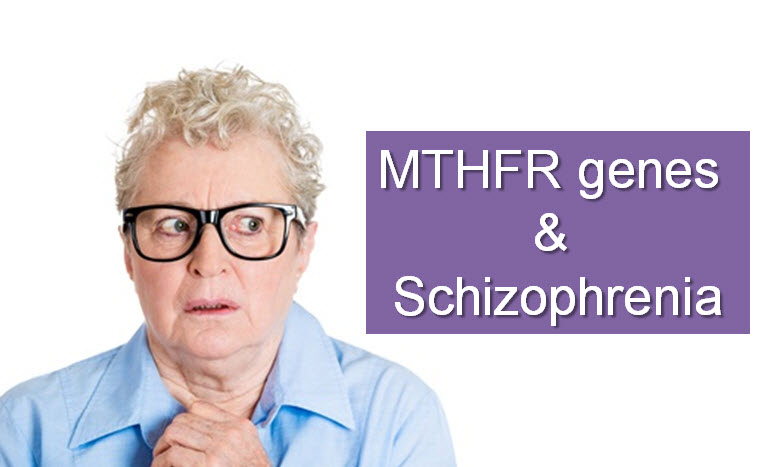Does MTHFR gene mutations cause schizophrenia?
Do you have symptoms of schizophrenia & MTHFR?
Schizophrenia is classed as a mental disorder. Many people who are found to have the mthfr gene mutation can have some of the symptoms of schizophrenia. Some of these people may even be diagnosed with schizophrenia. But it is important to understand that schizophrenia is not the result of simply having mthfr gene mutations. However, mthfr gene mutations can contribute to the disorder.
So what is schizophrenia anyway?
Schizophrenia was a name given to a bunch of symptoms that had an effect on a person’s mental health. When we look at schizophrenia for what it really is. It is more like a number of problems combined together that make it look like schizophrenia. Having schizophrenia or symptoms of schizophrenia means that you have a number of problems going on. At the same time and when each one of these problems is resolved. More often than not schizophrenia get resolved. Let’s take a look at the symptoms of schizophrenia.
Symptoms of schizophrenia
- Depression
- Anxiety
- Fears, phobias and paranoia
- Dis-perception and thought disorders
- Illusions and delusions
- Auditory and visual hallucinations
- Anti-social behavior
As you can see from the symptoms of schizophrenia above. When you break them up you quickly find that most people have had one or more of the symptoms. To some degree at some point and this is especially true for those with mthfr gene mutations. The main problems that are associated with causing schizophrenia including the symptoms above is:
Causes of symptoms of schizophrenia
- Blood sugar imbalances
- Essential fat imbalances
- Too many oxidants and not enough anti-oxidants
- Abnormal methylation and high homocystenine
- Niacin deficiency
- Pyroluria
- Wheat & other allergies
MTHFR & Schizophrenia
When you have mthfr gene mutations it’s not hard to find yourself with any of the causes of symptoms of schizophrenia. This is because the mthfr gene mutations and many of the additional mutations that come with them lead to nutritional imbalances. That start from having a folate deficiency, this then causes a break down in biochemistry. That’s when the health problems start, they may be physical and or mental problems.
For those who have mthfr gene defects such as C677T & or A1298C. The biggest problem that can lead to schizophrenia comes from having methylation problems and high homocystenine. One of the unfortunate side effects of having mthfr gene problems is that this particular polymorphism is much more common in people diagnosed with schizophrenia. In fact, while schizophrenia can happen to anyone it is twice as likely to happen to someone diagnosed with C677t simply because of the inability to convert folate into methylenetetrahydrofolate reductase (MTHFR). This also interferes with other important B vitamins that ultimately are involved in making the the methylation cycle work properly.
Having mthfr C667T also triples your risk for having manic depression. Such as in bipolar disorder which significantly increases the chances for developing schizophrenia. This is as a result of the reduction in neurotransmitters. Such as serotonin which is important for mood and dopamine which is key for motivation.
Niacin
When it comes to mthfr and having schizophrenia niacin deficiency deserves a special mention, many mthfr patients complain of or have had a history of 1 or more of the symptoms of a niacin deficiency such as:
Niacin deficiency & schizophrenia
- Acne
- Anxiety
- Bleeding or tender gums
- Dementia
- Depression
- Dermatitis
- Diarrhea
- Eczema
- Hallucinations
- Headaches or migraines
- Irritability
- Lack of energy
- Poor memory
- Sleep disturbance or insomnia
- Tension
- Thought disorders
MTHFR, schizophrenia, adrenalin & CFS
Some people with certain mthfr gene mutations have a higher need for niacin. This is because niacin stops the brain from producing adrenochrome from adrenalin. There is a chemical known to induce hallucinations. Niacin also protects vitamin B12 from oxidation which helps to normalize methylation. This, in turn, is vital for keeping adrenalin and noradrenaline levels in balance which further. It helps prevent chronic fatigue syndrome (CFS) that is so common in those with mthfr.
MTHFR, schizophrenia, histamine & copper
Niacin combined with vitamin B12 and activated folate (deficient in those with mthfr gene problems). Works together to raise abnormally low histamine. Which is another problem associated with hallucinations in schizophrenia. Niacin also helps to flush out excess copper which is also associated with schizophrenia. And lastly, niacin helps make use of essential fats that have been found as one of the causes of schizophrenia.
MTHFR, schizophrenia & essential fatty acids
Our brains are largely made of essential fats. One of the processes that keep our brain healthy with the right amount of essential fats is methylation. As well explained many times when methylation is impaired in those with mthfr. So can the process by which our brain is repaired. For example, those with schizophrenia have an enzyme that breaks down the essential fats in the brain too fast which depletes the brain of essential fats and so requirements of essential fats have to go up.
The problem with mthfr defects is 2 fold. One, the breakdown enzyme is breaking down brain fats too fast. Second, those with mthfr have a harder time getting those fats usually. Because their B vitamins aren’t able to work together properly to digest these fats. All of this, of course, makes it easier for a person with mthfr gene mutations to end up with schizophrenia.
Treating schizophrenia & MTHFR
Schizophrenia is a complicated problem. While mthfr gene mutations are not the direct cause. They certainly can contribute to becoming schizophrenic. If you have been diagnosed with schizophrenia. You haven’t been tested for mthfr gene mutations it could very well help you solve the problem. If you have mthfr gene mutations and you have any of the above symptoms or deficiencies it is best to seek professional help in treating the condition.


